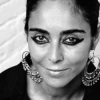Shirin Neshat

Shirin Neshat
Shirin Neshatis an Iranian visual artist who lives in New York City, known primarily for her work in film, video and photography. Her artwork centers on the contrasts between Islam and the West, femininity and masculinity, public life and private life, antiquity and modernity, and bridging the spaces between these subjects. Neshat has been recognized countless times for her work, from winning the International Award of the XLVIII Venice Biennale in 1999, to winning the Silver Lion for best director...
NationalityIranian
ProfessionScreenwriter
Date of Birth26 March 1957
CityQazvin, Iran
Every Iranian artist dreams of the black market. We don't care about making money.
There is nothing negative about a group of people crying out for democracy - and if my voice counts, I will be vocal.
I believe we don't need to widen the divide between the West and Islam. Rather, we need to build dialogue to encourage tolerance and respect.
I believe and support the feminist movement, but I am not generally interested in considering women's rights in relation to equality with men, or in a competition with men, but rather within their own rights and feminine space.
My father was a doctor, but he was what I would call an intellectual - very well-read and very interested in knowledge. He insisted that I get as much education as my brothers.
I think of myself, an Iranian/American artist, and wonder what would I want if I'm ever imprisoned by the Iranian government for the work that I make? I answer: I would hope that the United States government comes to my rescue.
The first years of my life in the U.S. were very difficult.
Those of us living in the state of in between have certain advantages and disadvantages. The advantage of being exposed to a new culture and in my case the freedom that comes with living in the USA. The disadvantages of course being that you will never experience again being a center or quite home anywhere...
Magical realism allows an artist like myself to inject layers of meaning without being obvious. In American culture, where there is freedom of expression, this approach may seem forced, unnecessary and misunderstood. But this system of communication has become very Iranian.
Art is no crime. It's every artist's responsibility to make art that is meaningful
I'm really interested in social justice, and if an artist has a certain power of being heard and voicing something important, it's right to do it. It could still be done in such a way that it's not aggressive or overly didactic. I'm trying to find that form.
Poets use metaphors and symbolism to construct images. I construct my images in the same way, except that I am using a different form.
Being political is an integral part of being Iranian. Our lives are defined by politics.
In this Western world that we have, culture risks being [only] a form of entertainment.